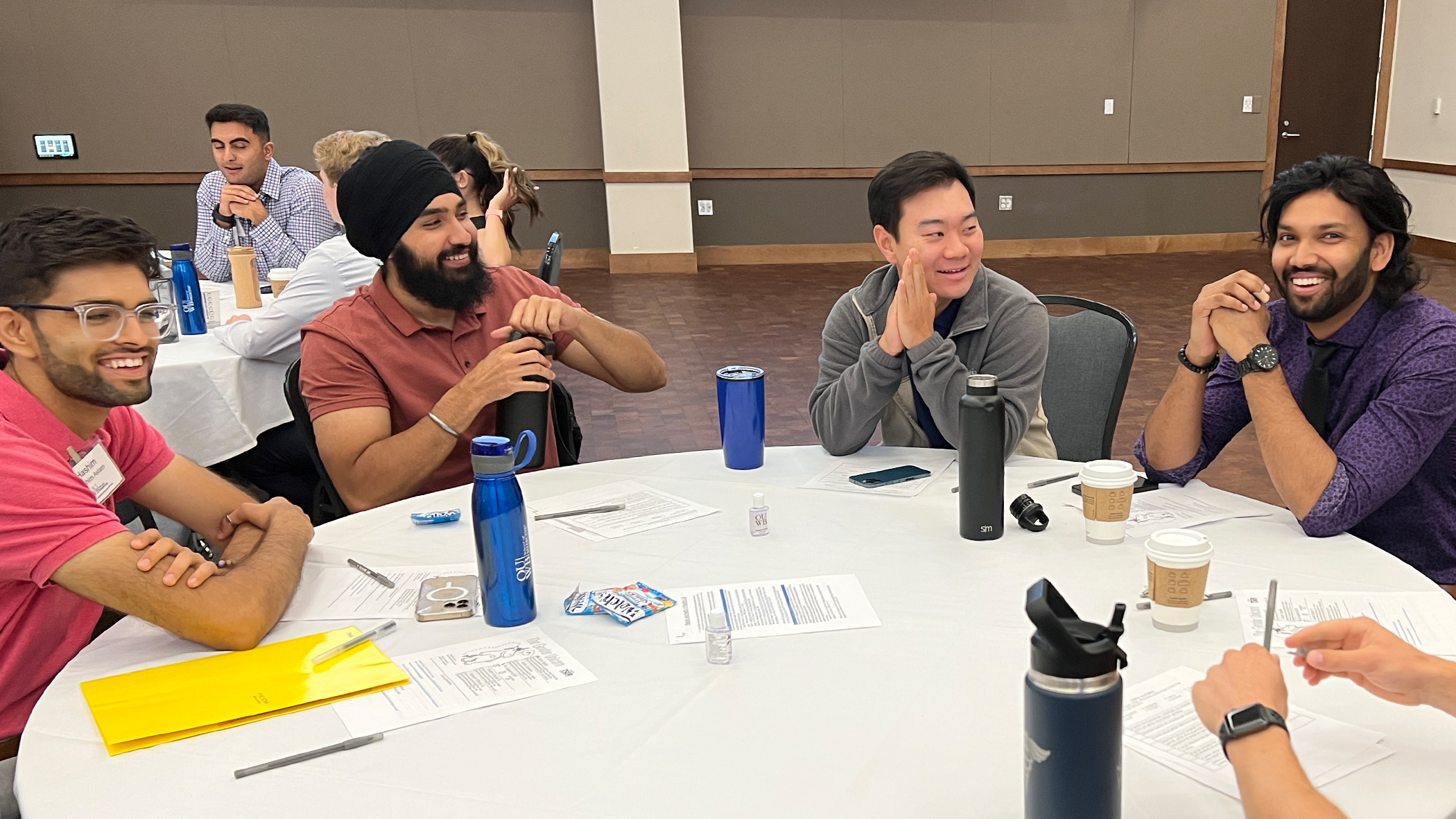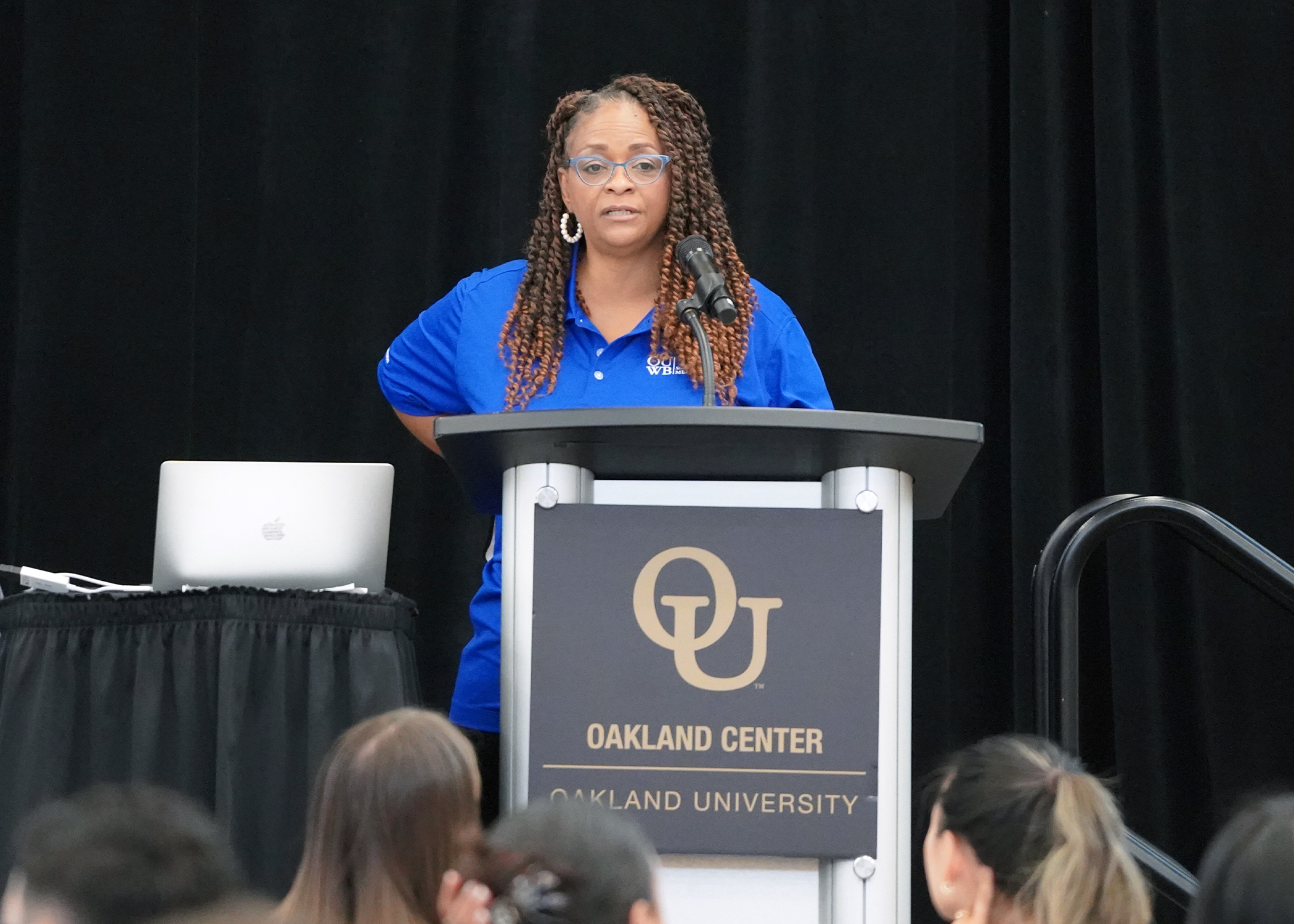
The Oakland University William Beaumont School of Medicine’s Class of 2026 learned more about the topics of diversity, equity, and inclusion in a fun, informative workshop on Tuesday.
Hosted by OUWB’s Diversity & Inclusion team, the students were provided with insights on the topics as they bonded with each other — a big focus of the day and orientation week in general.
The day was led by Deirdre Pitts, Ph.D., associate dean for Academic, Faculty Affairs and Diversity & Inclusion.
“We cannot have this institution without this training, it’s that important,” she said.
Throughout the day, students worked in groups and listened to several presentations.
In addition to Pitts, presenters were Angie Freeman, coordinator, Diversity & Inclusion, and Diversity & Inclusion Assistant Deans Vonda Douglas-Nikitin, M.D., Sheala Jafry, M.D., Payal Shah, M.D., and Tracey Taylor, Ph.D.
“It’s something we definitely need to learn more about and be reminded about here and there,” said Derrik Nghiem. “A lot of places don’t put this kind of emphasis on diversity and inclusion.”
‘We’re striving for the same goal’
Pitts and Shah guided the first portion of the workshop centered around privilege and social identity as well as unconscious and conscious bias. Students also reflected on their own experiences.
The presentation highlighted ways to mitigate biases such as introspection, self awareness, building cultural awareness, practicing cultural humility, and managing one's behavior.
“I would really encourage you, especially if you perceive something about a patient that's making them uncomfortable, share a story with them, really try to personalize that experience,” said Shah.
“It only takes less than a minute and sharing your stories even as health care providers with the patients that you're going to see will make a big difference in comfort level,” she added.
Another session led by Jafry and Taylor focused on racism and its impact on health. They discussed how internalized racism throughout history and today creates distrust and health disparities among different races.
 | |
| Pitts told OUWB's newest class that, "We cannot have this institution without this training, it’s that important." | |
 | |
| Pitts told OUWB's newest class that, "We cannot have this institution without this training, it’s that important." |
The session brought to attention that more Black people than white people have distrust in health care and that is due to previous studies and experimentation such as the Tuskegee Syphilis Study. Students were given ways to address these issues such as advocacy, building trust with patients, and mitigating unconscious bias.
Jafry left the group with an inspirational message after the session.
“Kindness matters, be nice to one another, bring goodness with you every day, what you send out in the world comes back to you, people need more smiles and kind acts, we’re all in this life together,” she said. “So just remember, we're all a team. We're striving for the same goal to help people and make this a better place.”
The next session was called “Enhancing Community Through LGBTQ+ Inclusivity” and was held by Freeman and Pitts. The session explored differences between sex, gender and orientation, and how each should be used in the world.
“Go through that exploration for yourself because the more you understand about yourself, the more you can understand about others in your patients as well,” said Freeman.
“Remember that all of our patients are impacted by this… especially within the medical curriculum and hopefully you start to just think about gender as a spectrum,” they added.
The session also focused on some of the challenges the LGBTQ+ community faces, such as being denied health care because of being transgender, unsafe school climate, and avoiding medical treatment in fear of experiencing bias.
The session provided three big ways to help everyone feel inclusive in their lives; allyship, advocacy, and activism. The students were encouraged to engage with the OUWB Kaleidoscope Project.
“We want something to show individuals who our allies are,” Pitts said.
“I’m very pleased with that project because it was student-led and we were able to give students what they asked for.”
The final session was centered on creating a respectful and inclusive culture. Tools and guidelines were given to the students to help them become more welcoming and inclusive to other students as well as professors and patients.
“This is what we’re trying to give you, the framework in terms of how you can figure out what you can do,” said Douglas-Nikitin.
The students learned how to handle difficult situations and conversations that may arise from people who unknowingly or knowingly say something disrespectful.
Reflection
Pitts emphasized how important it is to have this session and for the new students
“It's just so important for people to understand the importance of difference and the impact it has on their experience,” she said.
Pitts said it was important to have diversity, equity, and inclusion encompass a full day of orientation.
Her hope, she said, is “that people can look around the room and say, ‘I had an opportunity to meet someone different, and now understand how important it is to embrace people who are different than I am.’”
The students were able to realize what this means to those involved in running the program and what it will mean for their career as health care professionals.
Ethan Dimock appreciated the experience saying it was “very relaxed” and a “very friendly atmosphere.” He reflected on how it will impact his future.
“I think, especially our third- and fourth-year when we're working in a hospital, this will be crucial in order to help develop clinical skills that are more equitable and more able to treat patients in a way that is respectful,” he said.
Shafiul Alam said the entire session was “really interesting and informative.”
He said one of his biggest takeaways was better understanding of “making sure you’re addressing people the way they want to be addressed.”
“I was really impressed that they emphasized (topics related to diversity, equity, and inclusion) so heavily and exposed everyone to them…whether they were previously exposed to them or not,” he said.
To request an interview, visit the OUWB Communications & Marketing webpage.
NOTICE: Except where otherwise noted, all articles are published under a Creative Commons Attribution 3.0 license. You are free to copy, distribute, adapt, transmit, or make commercial use of this work as long as you attribute Oakland University William Beaumont School of Medicine as the original creator and include a link to this article.

